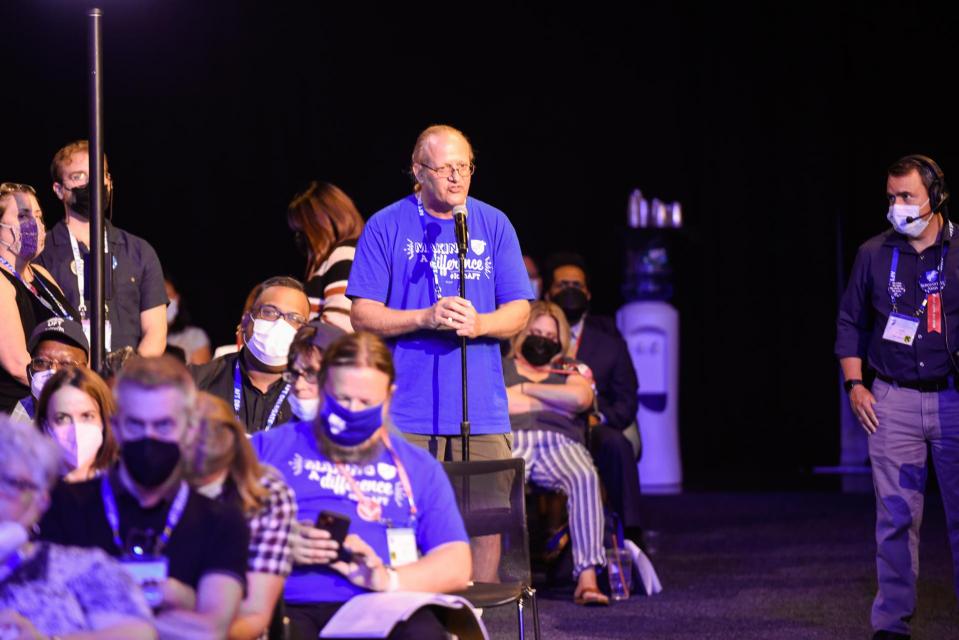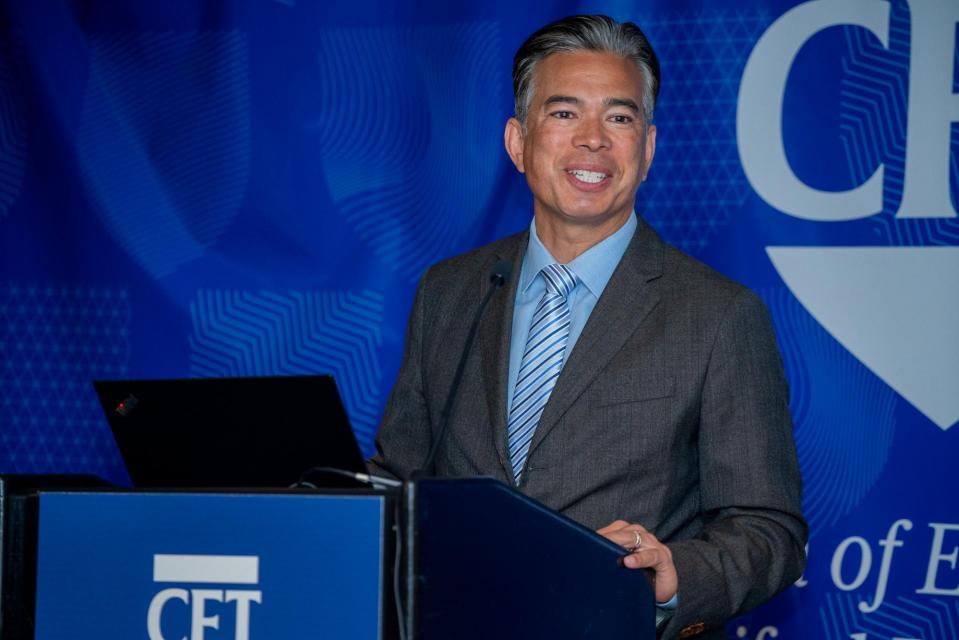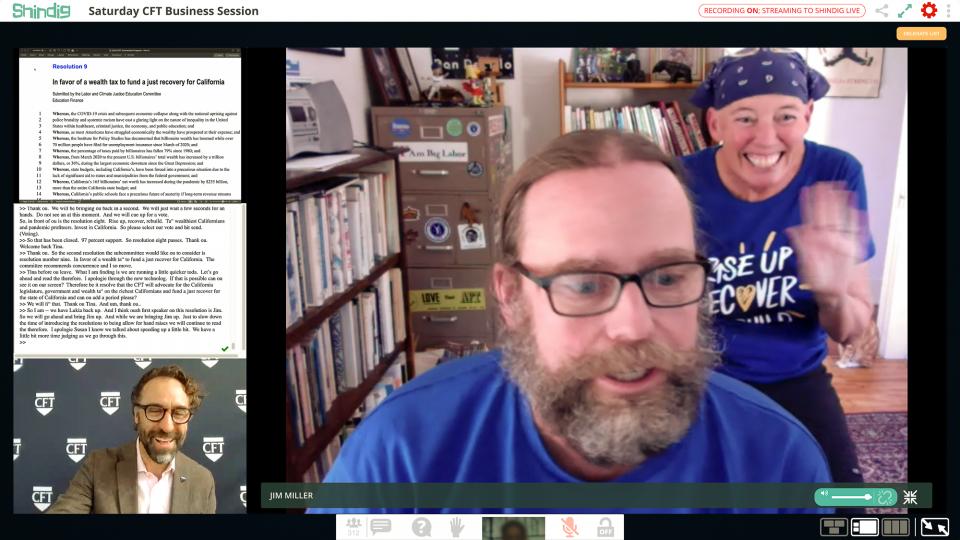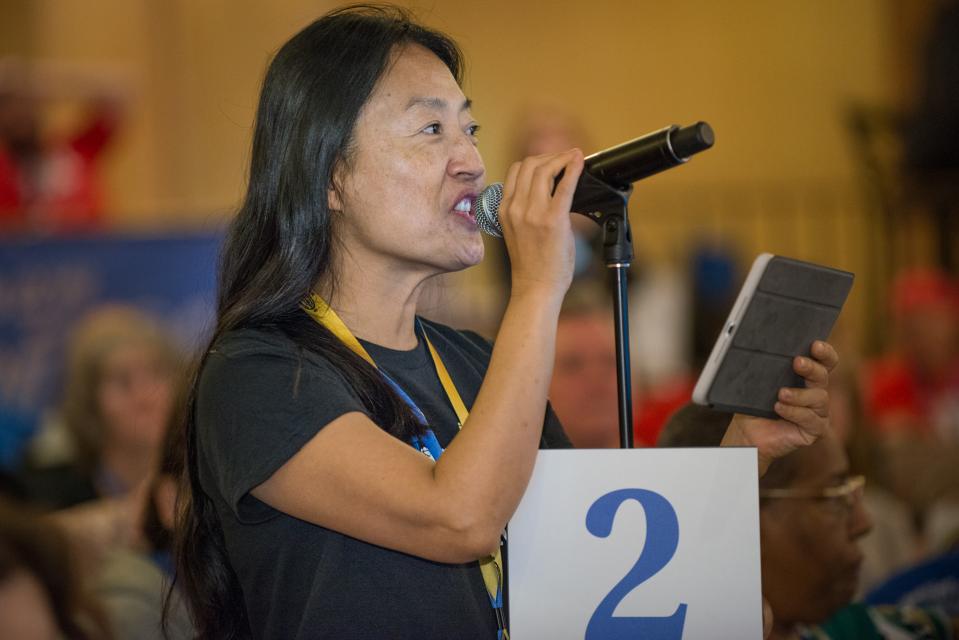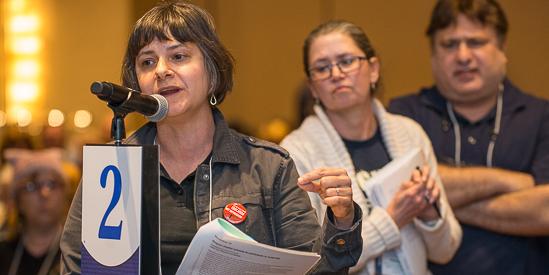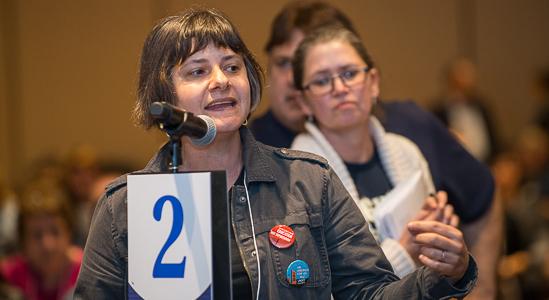AFT resolution asks U.S. Department of Education to conduct higher ed study
Calls for national data about adjunct/contingent pay and benefit inequities
CFT once again demonstrated its commitment to adjunct/contingent faculty by submitting and winning unanimous passage of its resolution “Calling for Department of Education Study of Pay and Benefit Inequity” at the AFT Convention July 15 in Boston.
State Council inspired by Attorney General Rob Bonta, passes six resolutions
Recruiting more education workers, healthcare for part-time faculty, climate justice top agenda
California Attorney General Rob Bonta kicked off the State Council meeting on Saturday morning, March 19. After an introduction by CFT President Jeff Freitas who talked about Bonta’s commitment to going after people who use their power to harm others, demanding corporate accountability, and fighting for public education, Bonta came on stage.
He talked about how the encouragement and support of staff, coaches and teachers had made it possible for him to go to college and then to law school.
CFT resolution recognizes Armenian Genocide
Find classroom resources to teach about the genocide
During World War I, the Ottoman Turks carried out one of the largest genocides in the world’s history, massacring 1.5 million Armenians. Turkey continues to deny the genocide, but the U.S. Congress passed a resolution to recognize it in 2019.
This spring United Teachers Los Angeles, in conjunction with the CFT Civil, Human, and Women’s Rights Committee, brought a resolution before CFT Convention calling for the state federation to formally recognize the Armenian Genocide and commit to sharing resources for teaching about it in the classroom. The Executive Council passed the resolution on June 12.
Delegates pass wide range of resolutions — from their homes
PHOTO GALLERY: Condemn anti-Asian violence, support wealth tax, mandating healthcare for part-time faculty
At this year’s CFT Convention, several resolutions provoked a lot of discussion, especially considering the attendees were virtually raising their hands to be acknowledged from their living rooms, rather than on the actual convention floor. Some of these included condemning anti-Asian violence, mandating healthcare for part-time faculty, reforming Social Security to support teacher retirement, supporting the PRO Act to increase union organizing, and maintaining a list of retirees to contact.
State Council passes pandemic-related resolutions
First-ever online State Council brings large turnout
The CFT held its first online State Council on May 2. In what may be the highest attendance in recent years, about 140 representatives from local unions tuned in on a Saturday afternoon for the well-managed three-hour Zoom meeting that allowed delegates to vote on numerous policy issues before the Federation.
Delegates reaffirm support for part-time faculty voice in shared governance
While the issues of pay inequity, the lack of job security, and access to health benefits are major challenges that plague part-time faculty —collegiality, inclusion, and connection with their campuses and fellow faculty are also important for a part-time faculty member’s long-term involvement with a particular institution.
Key to increasing adjunct involvement and connection in the California community colleges is increasing both the opportunities for and compensation of part-time faculty participation in shared governance.
Delegates pass wide-ranging resolutions at Convention
Topics range from rebranding and retirees to the Green New Deal
On its 100th Anniversary, the CFT voted to rebrand itself. In accordance with Resolution 1, which convention delegates passed unanimously, it will now be CFT: A Union of Educators and Classified Professionals. The change formally recognizes that the union proudly represents a broad spectrum of education workers.
Luukia Smith, elected Secretary Treasurer of the CFT by delegates, and the first classified employee to serve in this position, was first to rise in support of the change.
AFT resolution supports $7,000 per three-credit course for adjuncts
One of the more talked about resolutions passed by the biennial AFT Convention this July was Resolution 15, which calls for AFT to support City University of New York adjuncts in their quest to achieve through “actions, demonstrations, and advocacy,” a minimum of $7,000 per three-credit class.
The resolution, which passed with resounding support and no opposition, also supports this minimum in “all other AFT locals’ campaigns for fair adjunct pay.”
State Council resolution reiterates support for statewide health insurance for part-timers
On May 5, the State Council approved a resolution put forth by the CFT Part-Time Committee, calling for CFT to sponsor legislation “to establish a permanent healthcare program for part-time faculty and their dependents.”
Convention votes to raise part-time workload cap to 80 percent
At this year’s CFT Convention, delegates passed Resolution 15 calling for the CFT to support changing the workload cap in a community college district to 80 percent of a full-time equivalent load, effectively allowing part-time faculty to teach up to 12 units.
Floor debate: Delegates take decisive action
Pass resolutions on part-time faculty workload, McTeacher Nights, pesticide use, charter teacher retirement
About 400 delegates discussed resolutions on a broad range of policy issues; heard from the law school dean at UC Berkeley, Lt. Gov. Gavin Newsom, and Tony Thurmond, the CFT-endorsed candidate for superintendent of public instruction; joined thousands to rally and march for safer schools and common sense gun control; learned a whole lot about Janus v. AFSCME, a Supreme Court case that could effectively turn the public sector into a “right to work” zone; and heard from a teacher in West Virginia where they succeeded in getting a 5 percent raise for all public employees.
Spirited debate on resolutions
Issues range from academic freedom and racial justice to community schools
At the CFT Convention March 31 through April 2, delegates took action on 23 policy resolutions addressing topics from community schools to immigrant rights to the Dakota Access Pipeline.
Democracy: Delegates pass resolutions and amendments
EC/TK-12 EDUCATION
Resolution 1 Support best practices in
Local Control Accountability Plans
Resolution 4 Ensure adult education exists
in its best and fullest capacity
Resolution 5 Call for rationality in
testing
Resolution 6 Support for the California
Education for a Global Economy Initiative
Resolution 7 Sponsor an education
technology implementation study
Resolution 8 Create a School Climate and
Student Engagement Advisory Committee
Resolution 10 Create a working group on
teacher induction
Floor debate: Delegates tackle rich array of social justice and education topics
Delegates took on social justice concerns, passing a resolution from the United Educators of San Francisco and the CFT Executive Council to officially support the “Black Lives Matter” movement. Resolution 23 calls for community meetings, teach-ins and curricula, such as what’s already posted on UESF’s website and AFT’s Share My Lesson.
Part-time-friendly resolutions passed at CFT Convention
At the CFT Convention in March, the full body of delegates passed three important resolutions that affect part-time faculty.
Union supports paths to full-time status for adjuncts
Delegates to the annual CFT Convention passed two resolutions submitted by the CFT Part-Time Committee calling for the union to pursue legislation that would help part-time faculty secure full-time employment.

